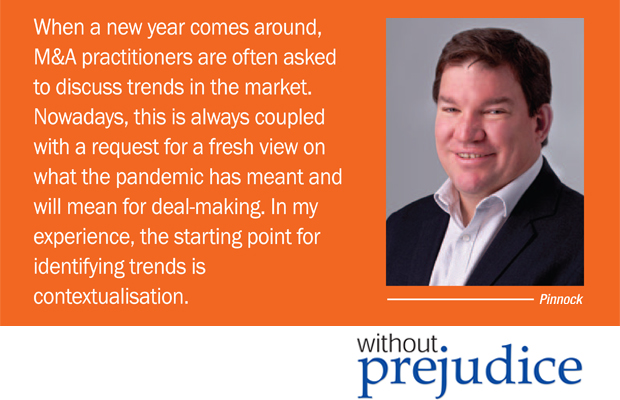When a new year comes around, M&A practitioners are often asked to discuss trends in the market. Nowadays, this is always coupled with a request for a fresh view on what the pandemic has meant and will mean for deal-making. In my experience, the starting point for identifying trends is contextualisation.
So, let’s consider the context: using the DealMakers public deal flow measures, as you might expect, M&A activity improved in 2021 from 2020. Some caution is warranted in that DealMakers only reliably measures the overall market in public deals, and there are many nonpublic deals not notified to DealMakers. However, it still remains the best, although incomplete, proxy we have for the total M&A market volume in South Africa. The 2020 calendar year (411 deals) is a shockingly low base though, given the effects of the first unprecedented worldwide lockdowns and the associated economic consequences. However, consider pre-COVID: in 2019, there were 488 deals; in 2018, 525 deals; and in 2017, 548 deals. So, one overall trend is that the South African M&A market was suffering a nasty downturn before COVID even swaggered up to bully the global economy out of its lunch money. In that sense, 2021 (483 deals) even in the context of the continued pandemic, begins to feel like the start of a recovery, particularly the strong fourth quarter.
That’s one trend contextualised, but is it the whole view? Of course not.
Perspective tends to shift if the camera draws back a bit further. The 2021 year was one for the record books for M&A globally. Not just a record gain from 2020, but a record year all by itself (PWC Global M&A Industry Trends: 2022). The M&A market worldwide has been booming to new heights, despite the ongoing pandemic. In that context, as might be expected, given the general state of its economy and political stagnation, South Africa is lagging.
There is always an argument to be made that corporate activity movements in Europe and the US (and increasingly other parts of the globe) arrive in South Africa with a bit of a time lag. The thinking goes something like this: capital is deployed in those markets and as it chases returns, it pushes up asset prices until the returns are not as easy to come by; the capital then overflows into other markets, where the asset prices have not yet reached the same heights. Thus, a protracted M&A boom in bigger jurisdictions should overflow into markets like South Africa.
It should logically follow that the trends in those other markets should be broadly reflected here when the overflow reaches us. Anyone fancy a SPAC for a fintech play?
Does all of this mean that the boom times are just around the corner?
The anecdotal evidence could easily lead a glass-half-full observer to reach quite a cheerful conclusion. Some of this is, no doubt, new year hopefulness, as South Africa bobs up from under a nasty COVID wave and people start to trickle back into their eerily quiet offices a few days a week. But there does seem to be a real feeling of (admittedly, still cautious) optimism around.
Life in the pandemic has taught us some valuable lessons, if we take heed:
- Dealmaking continues through the most challenging of circumstances, and sometimes because of the most challenging of circumstances;
- We are more resilient than we realised;
- and The world continues to turn.
Also, and perhaps the most important context of all: we are not great at identifying the fabled trends we keep looking for. During the scary days of the first lockdown, it was widely thought that there would be many more distressed sales than actually happened. We anticipated that transaction flow would be more depressed than it actually turned out to be. We thought that there would be more foreclosures, more emergency equity capital raises, more equity holders sitting tight to wait out the COVID storm. All those things happened, but not to the extent predicted, and often much later than we anticipated. Our predictions were affected by that most human of things: the emotions of the moment.
Of course, it is those emotions that bubble up as the next geopolitical catastrophe invades Ukraine and the front pages. Like the pandemic, the terrible human consequences deserve our attention, our outrage and our emotions, but we need to realise that our assessment of the effects of such things on M&A markets needs a bit more distance.
So perhaps the best thing to do is to temper both optimism and pessimism, acknowledge that we work in an environment noisy with news, pushed and pulled by a multiplicity of variables and, in the words of the meme, just keep calm and carry on.
Dave Pinnock is a Director in the Corporate & Commercial practice and Co-Head for the Private Equity sector at Cliffe Dekker Hofmeyr, incorporating Kietie Law (Kenya).

This article first appeared in DealMakers’ sister publication Without Prejudice
DealMakers is SA’s M&A publication.



